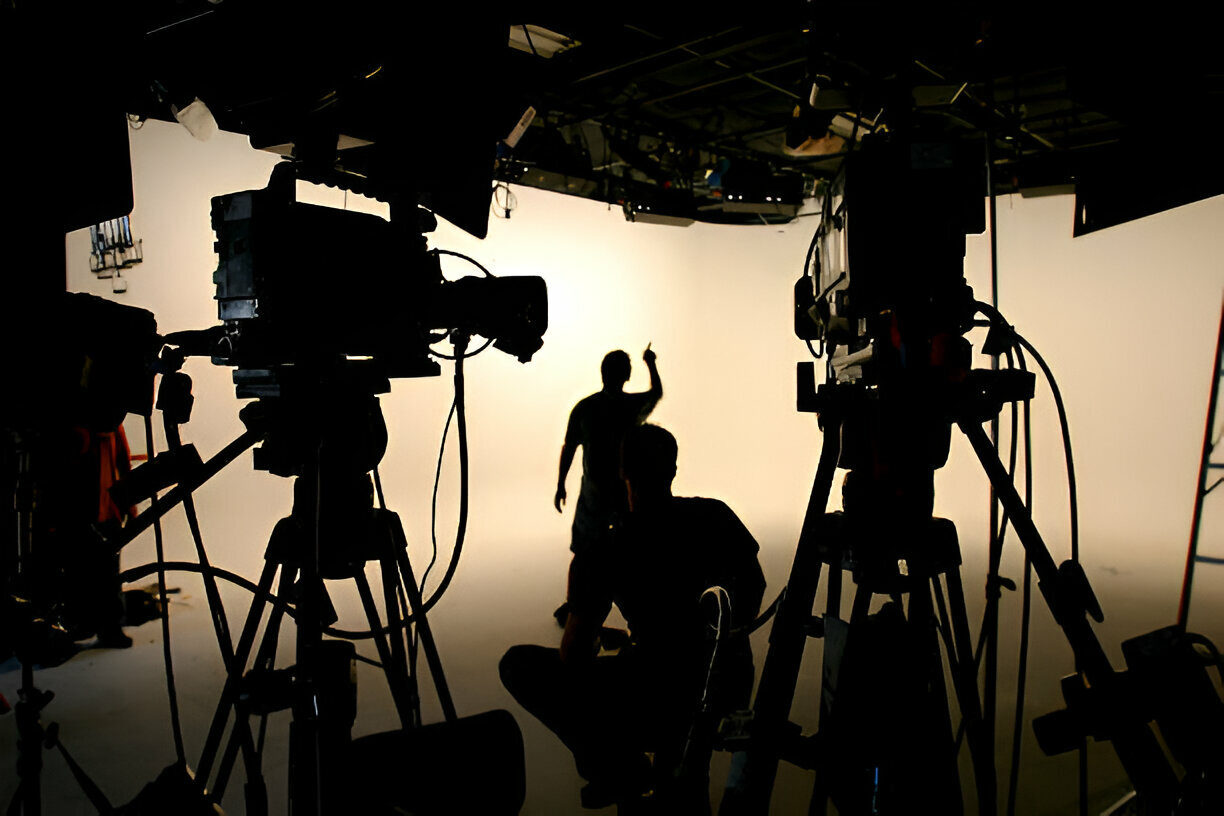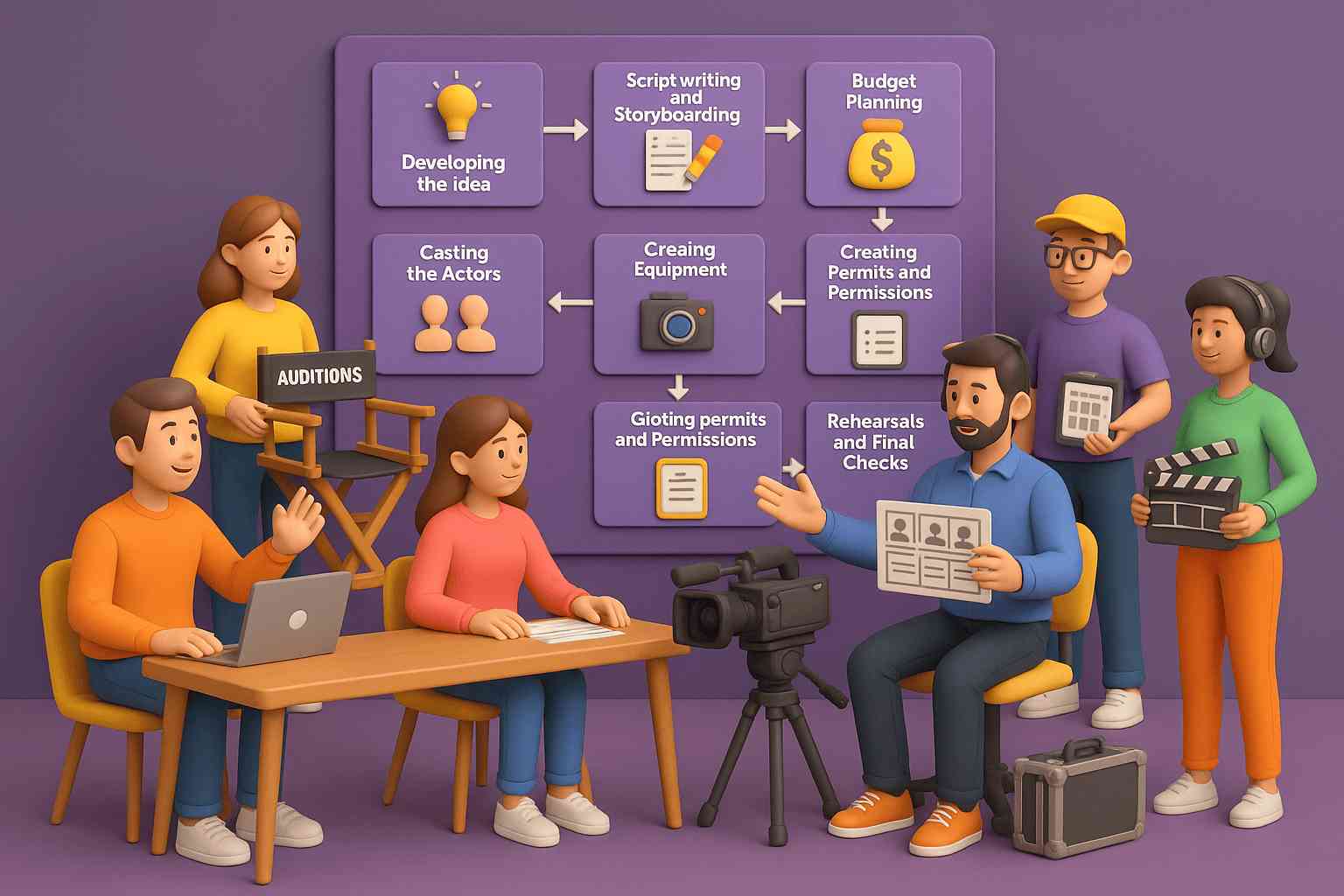At Which Stage Do Planning and Preparation for a Video Production Happen?
The process of making a video call for thorough multi-phase planning. Planning and preparing for a video production mostly takes place during pre-production.
It sets the basis for the whole production. Therefore, this step is most important. The shooting process can become messy, expensive, and useless without the right planning and preparation.
This blog covers the pre-production stage and why it’s important. We’ll look at key tasks and the people who make a video successful.
Understanding of Pre-Production in Video Production
The very first and most important phase in video production is pre-production. It happens before filming starts. The team plans everything, organizes resources, and gets ready for the shoot.

This stage includes developing the idea and making a shooting schedule. It acts like a blueprint for the whole project. Pre-production helps save time and effort. The process ensures everything is ready for smooth production.
Why Is It Important to Plan and Prepare?
A good video depends on planning and preparation. The pre-production phase guarantees everything is set before shooting begins. It includes choices that affect video quality.
A solid plan saves energy, money, and time. It helps avoid mistakes during filming. Pre-production keeps the team organized and clear.
It brings creative and technical parts together. Without it, even great ideas can fail due to poor execution.
9 Key Steps During Pre-Production
Pre-production consists of many stages. Everyone is rather important in preparing for the video shoot.

-
Developing the Idea
It’s a first step in the pre-production phase. This idea forms the foundation of the project. It could be a story, message, or concept to communicate.
The team discusses the idea, and once it’s clear, the planning starts. The idea guides scriptwriting, casting, and visual design decisions.
-
Scriptwriting and Storyboarding
After the idea is ready, scriptwriting begins. The script outlines dialogues, actions, and scenes. It keeps everyone on the same page.
Some teams also create a storyboard, showing each scene in pictures. Scriptwriting and storyboarding turn the idea into a clear visual plan for the video.
-
Budget Planning
Pre-production is when you create a budget for the video. The budget controls costs during production. This includes post-production, location fees, equipment, actors, crew, and other costs.
A well-defined budget guarantees the project remains within the limits of the budget. This helps to avoid overpaying. It keeps everything on track.
-
Casting the Actors
In pre-production, actors are cast for the video. The process of casting includes actors who fit the parts and can tell the story in words.
Though the director makes a final decision, the casting director often manages all these things. The success of the video depends on selecting the right actors.
-
Location Scouting
Pre-production depends on location scouting. The team finds locations that match the script. The location sets the mood and tone.
It must be practical for shooting and available on the scheduled dates. A good location enhances the story and brings your vision to life.
-
Preparing Equipment
Next, gather essential tools like cameras, sound gear, lights, and props. It guarantees the right execution of everything.
The team must test the equipment before filming. This helps avoid technical issues during the shoot and ensures a smooth production process.
-
Creating the Shooting Schedule
Pre-production creates a shooting schedule. This shows the filming time frame, including when and where every scene is shot. It ensures that filming stays on top and keeps the team organized.
The schedule also helps manage resources like actors and equipment by assigning tasks and locations for each filming day.
-
Getting Permits and Permissions
Some locations require legal permits for filming. During pre-production, the team checks if permits are needed. If so, they apply early. Public areas like parks or streets especially need this.
The team can fall into legal issues or shut down without permissions. Following these rules ensures the project stays safe and legal.
-
Rehearsals and Final Checks
Before filming starts, the team does rehearsals. Actors practice their lines, and the crew tests equipment and timing. Rehearsals act as a test run. They help identify any issues.
Fixing mistakes before the shoot is better. This is the final pre-production step. When all is set, everyone on the team can start shooting without a doubt.
Who Handles Tasks During Pre-Production?
The preparation phase is a team effort with many people playing various roles. Some of the main tasks during this stage are listed below:
-
Producer
During pre-production, the producer manages the budget, timetable, and resource allocation. They make sure all activities are finished on schedule and that everything stays on course.
-
Director
They manage the video’s artistic concept. Working with the producer, writer, and team, they make sure the film fits the concept. The director guides personnel and actors during production.
-
Scriptwriter
The writer of the script outlines the story, composes dialogue, and produces the screenplay. A solid video depends on a great screenplay. This guarantees a well-told story.
-
Casting Director
They choose parts, examine auditions, and choose actors. Working directly with the director, they make sure that the right actors are selected for the production.
-
Production Designer
The production designer creates the video’s look. They design sets, select props, and set the visual atmosphere. They work with the director to match the script.
-
Cinematographer
Camera work and lighting are handled by the cinematographer. Focusing on camera angles, lighting, and composition, they work with the director to design every scene.
-
Sound Engineer
They manage music, speech, sound effects, and other sounds. They provide great sound quality both during filming and post-production.
Key Challenges During Pre-Production
The Pre-production process is very helpful, but it can also be difficult. Some problems can slow down the video process or cause stress.
- It is hard to manage when there is not enough money for the video.
- The plan could be impacted by the script changing multiple times.
- Finding a day when all team members are free could be difficult.
- A few areas are not safe for filming or are too loud.
- Getting legal permits can take longer than expected.
- Equipment may stop working or may not be ready on time.
- The whole team may not fully understand each other, which leads to errors.
What Comes After Pre-Production?
Following pre-production, the team moves to the production phase. The filming takes place in this phase. Every concept and strategy comes to life at this point.
Post-production comes next after shooting. This covers effect addition, audio correction, music diversity, and video editing.
But none of this can happen well without strong pre-production. That’s why the first stage is so important in every video production process.
Conclusion
The preparation and planning take place in pre-production. In video production, it is the first and most important phase. It forms the base for everything that happens afterwards.
From idea development to script writing and team setup, all key tasks are done here. A strong pre-production plan saves time and avoids mistakes.
This helps the team stay organized and ready. Without it, the video may fail. Great videos always start with great planning.
FAQs
What makes pre-production different from production and post-production?
The planning phase is pre-production. The real shooting is production. Editing and last touches take place in post-production.
When should pre-production planning begin for a video shoot?
The preparation phase should start right after idea approval. This is the first formal stage of the video process.
What’s the typical time frame for the pre-production stage?
The overall size of the project decides this. It could last anywhere from a few days to several weeks.
Why is pre-production important in a video project timeline?
Good pre-production saves time later. This helps to prevent editing and shooting delays.
What kind of costs should be expected in pre-production?
The prices might cover permits, site searching, crew hire, and scriptwriting. Project size and requirements determine how much it differs.


